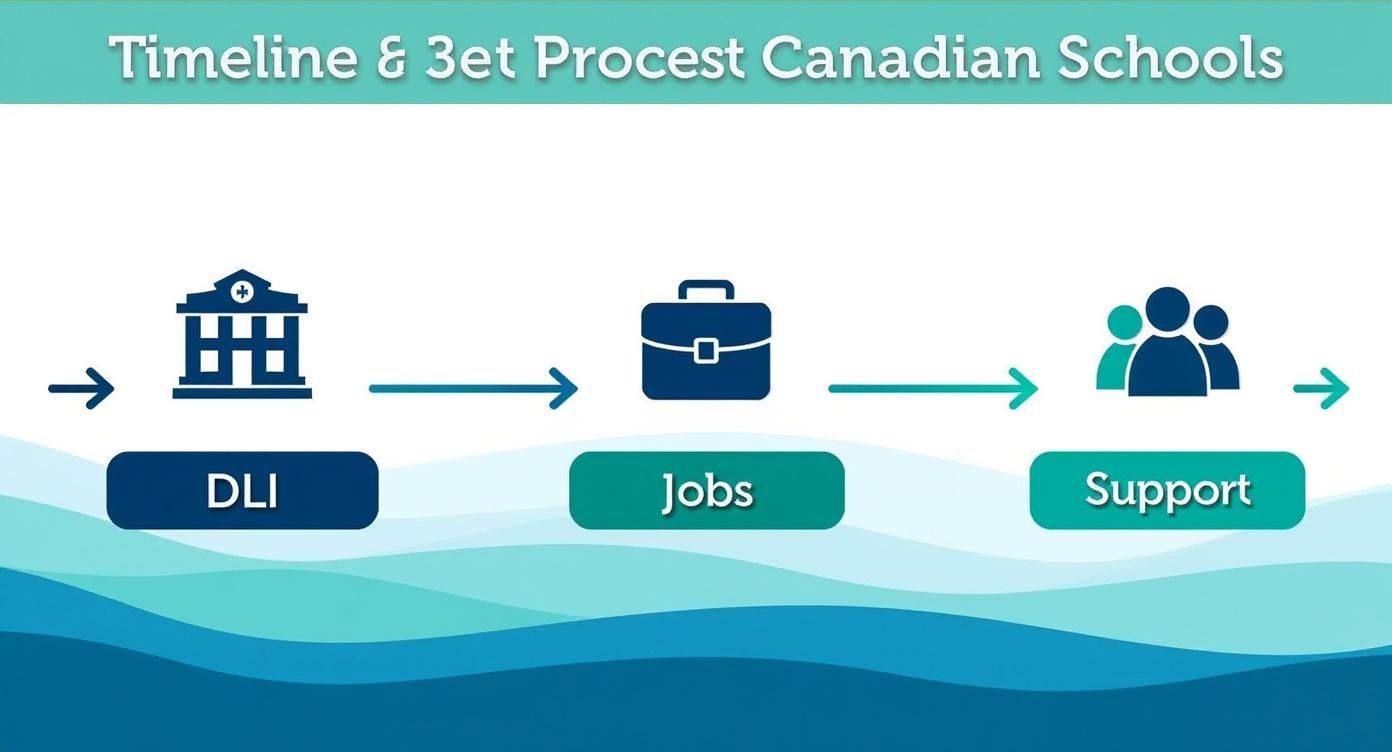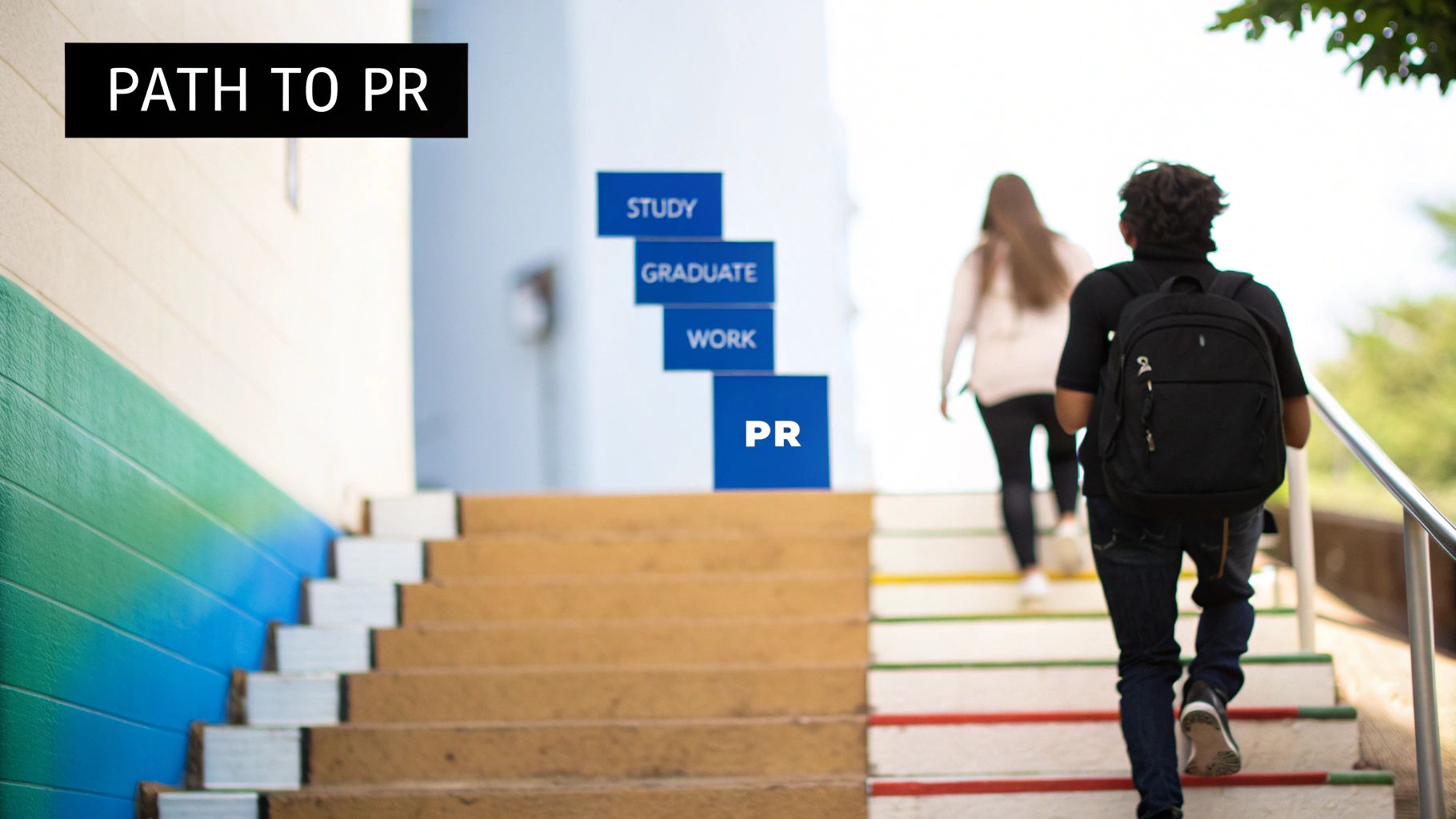Top Schools in Canada for Nigerian International Students Guide

When Nigerian students weigh up universities, colleges, vocational schools or pathway programmes in Canada, the decision often comes down to how each option maps to your background and career goals. Graduates from Lagos Polytechnic may favour hands-on skills in digital finance, while medical school hopefuls in Abuja target research-intensive MD tracks. This guide uses practical examples from Nigeria—like fintech scenarios inspired by Jumia and Konga—to help you find the best fit.
Understanding Your Canadian Study Options

Canada offers four main pathways:
- University Programmes: Deep dives into theory and research—ideal for medicine, engineering and data science.
- College Diplomas: Blend classroom work with co-op placements; perfect for applied careers like digital finance or hospitality management.
- Vocational Schools: Fast-track training in trades—welding, electrical work or culinary arts—in as little as six months.
- Pathway Programmes: Bridge courses and IELTS support, smoothing entry into full degrees.
University Programmes And Academic Depth
University study in Canada feels like exploring an ocean of ideas. Over 3–4 years, you’ll tackle lectures, labs and research projects. For example, medical aspirants complete four years of MD rotations at teaching hospitals similar to UNTH or UCH in Nigeria, preparing for licensure and global practice.
College Diplomas And Practical Training
Colleges focus on real-world skills. In a digital finance diploma, you might work on Lagos-inspired fintech case studies, partnering with local branches of Zenith Bank or GTBank. Hospitality students gain on-site experience at Canadian resorts, much like an intern placement at Radisson Blu in Lagos. To sharpen your quantitative edge, see how to study math effectively.
University = deep-sea theory; College = a sturdy raft you can jump onto day one.
| Institution Type | Primary Focus | Typical Programme Length | Credential Awarded |
|---|---|---|---|
| University | Theory, research | 3–4 years | Bachelor’s degree |
| College | Applied skills, co-ops | 1–3 years | Diploma or certificate |
| Vocational School | Trades and hands-on | Months to 1 year | Certificate |
| Pathway Programme | Language and bridging | 4–12 months | Entrance qualification |
Pathway Programmes For Smooth Transitions
If you need extra English support, consider a six-month bridge course in Toronto. After hitting required grades, you transfer credits into a BBA or engineering programme—similar to foundation years at YabaTech, but in Canada.
Choosing Based On Career Goals
- Research-driven: engineering, sciences → University
- Applied skills: digital marketing, culinary arts → College/Vocational
- Test the waters: language or foundation courses → Pathway
Balance your ambition with application steps and visa requirements next.
You may also want to consult our guide on the cheapest universities for international students in Canada to compare cost and quality.
Navigating Recent Immigration Policy Changes
New federal caps on study permits in 2024 mean Nigerian applicants must be strategic. Think of policy shifts like Nigeria’s exchange rate—volatile, but navigable with the right plan.
The Federal Cap On Study Permits
From January 2024, Canada limited new permits to balance enrolment. Atlantic provinces saw a 28% drop (6,431 students) in 2025. Manitoba’s decline was 5.4%. Read more at Global News.
Workarounds:
- Target programmes with higher intake caps—engineering tech or data analytics.
- Achieve standout scores: IELTS 7.5+ or TOEFL 100+.
- Highlight leadership in Nigeria: school clubs, community hackathons.
- Explore pilot streams like Nova Scotia’s International Graduate Stream.
Leveraging Provincial Initiatives
Provinces offer nominee programmes to attract talent. B.C. and Saskatchewan expanded STEM seats, while Ontario prioritises digital finance diplomas.
Key Insight: Provincial streams can be a lifeline when federal slots are tight.
- Research provincial nominee requirements for your field.
- Contact each DLI’s international office for current intake numbers.
- Prepare extra proof of funds: GIC plus scholarship or sponsorship letters.
Tips For Nigerian Students
- Apply early—before August—to beat the cap and Naira dips.
- Tailor your SOP to Canada’s labour market and Nigeria’s growing fintech scene.
- Join online webinars with alumni from your province of choice.
- Connect with current Nigerian students for cost-of-living hacks in Naira and CAD.
- Keep backup options in at least two provinces.
Healthcare tech, AI and data analytics remain high-demand sectors. Show visa officers you’ve done your homework.
Case Study Of A Successful Nigerian Student
Anita from Lagos applied to Vancouver Island University for digital finance. She showcased a Zenith Bank internship and led her school’s coding club in Abuja. Using JapaChat tools, she secured B.C.’s STEM Graduate Extension and starts January with a funded research assistantship.
Strengthening Your SOP And Interviews
A compelling SOP weaves in your Nigerian experiences—like coordinating a fintech hackathon in Abuja. For visa interviews at the Canadian High Commission in Abuja, practise concise answers about your study plan and funding. JapaChat’s mock interview feature builds confidence.
Managing Financial Requirements
Canada requires proof of CAD 10,000 living funds plus tuition. Nigerian banks (e.g., GTBank) partner with Canadian banks on GICs. Convert expenses to Naira—CAD 10,000 ≈ ₦4 million—to plan effectively.
| Province | Key Initiative | Eligible Fields |
|---|---|---|
| Nova Scotia | International Graduate Stream | Engineering, IT |
| Saskatchewan | Tech Talent Pathway | Data Analytics, Bioscience |
| Ontario | Digital Economy Priority Intake | Finance, Marketing |
| British Columbia | STEM Graduate Extension | Environmental Science, AI |
Tap into these regional schemes and ride policy shifts to your advantage.
Selecting The Best Canadian School For Your Goals
Choosing a Designated Learning Institution (DLI) is crucial—only DLIs qualify for the Post-Graduation Work Permit (PGWP). Next, find a programme that links your Nigerian network to Canadian and global jobs.
- DLI Status: Check IRCC’s official list before you apply.
- Program Fit: Match your Lagos background—fintech, oil & gas or agriculture—with Canadian strengths.
- Lifestyle: Big cities like Toronto cost more (rent
CAD 2,000/month) versus Fredericton (CAD 700). - Support Services: Mentorship, cultural clubs (Nigerian Students Association) and career centres.
Evaluating DLI Status And PGWP Eligibility
If a campus isn’t on the IRCC list, you can’t get a PGWP. Ade compared the University of Toronto (tuition ~CAD 60,000) with Northern Alberta Institute of Technology (NAIT, ~CAD 25,000 including paid co-ops).
Key takeaway: Alberta Polytechnic’s CAD 25,000 fee plus CAD 15,000 in co-op earnings offered a clear ROI.
Matching Program To Nigerian And Global Job Markets
At a Lagos job fair, alumni from your chosen Canadian programme can fast-track hires. Software engineering, data analytics and renewable energy are hot both at home and in Canada.
- Alumni Network: Identify Nigerians working in Toronto’s fintech hubs.
- Industry Ties: Leverage partnerships—McGill’s green-tech labs or U of T’s finance incubator.
- Co-op Earnings: NAIT students earn CAD 15,000+ across three terms.
- Employment Rate: Look for schools with 85% of grads employed within six months.
Lessons From A Growing University
The University of New Brunswick (UNB) boosted enrolment by 10% in 2025 through online courses and stronger student services. Read more on tj.news.
Considering Campus Life And Support Services
Toronto’s hustle comes with a higher price tag; Fredericton offers a tight-knit community and lower living costs. Look for:
- Nigerian Clubs celebrating Independence Day and Eyo festivals.
- Career Centres with resume workshops and employer mixers.
- Health Services with accessible mental-health support.
Balancing Costs, Co-op And Future Employability
| School Type | Tuition Range | Co-op Earnings |
|---|---|---|
| University | CAD 40,000+ | Optional paid |
| Polytechnic | CAD 20,000–25,000 | Mandatory paid |
Polytechnic fees often sit under CAD 25,000, but include paid placements. Research universities cost more yet bolster your resume for grad school or global roles. Ade chose a CAD 22,000/year programme with three paid rotations worth CAD 12,000 total.
Putting It All Together
- Verify DLI status, fees and visa-approval stats.
- Match programmes to your Nigerian network and interests.
- Compare support, lifestyle and co-op potential.
- Join virtual info sessions and alumni Q&As for real-world insights.
Final Tips And Considerations
Remember Canada’s climate: Manitoba winters can dip below −30 °C, while Vancouver stays above 0 °C. Return flights Lagos–Toronto run around USD 1,500.
- Join Nigerian student groups for home-style gatherings.
- Check part-time work rules (20 hrs/week) to help cover living costs.
Demystifying the Application And Visa Process
Applying from Nigeria involves multiple steps. Your starting point is an acceptance letter from a Designated Learning Institution (DLI)—your golden ticket for a study permit.
- Document Prep: Have transcripts evaluated through WES and secure certified translations.
- Language Tests: Target IELTS 7.5+ or TOEFL 100+ using tailored study plans.
- References: Two academic and one professional referee strengthen your profile.
- Proof of Funds: Open a GTBank–RBC GIC for CAD 10,000 and show tuition deposit receipts.
- SOP: Craft a narrative linking your Lagos or Abuja roots to Canadian ambitions.
Check Canada eTA requirements for visa-exempt travel before booking flights.
Creating A Strong Statement Of Purpose
Frame your SOP as a story: cover your Nigerian education milestones, leadership in community projects, and specific reasons for choosing your DLI and programme.
Understanding Proof Of Funds Requirements
Canada requires a GIC of at least CAD 10,000 plus tuition deposit evidence. Nigerian banks often partner with Canadian banks for GICs; convert CAD to NGN (≈₦4 million) to prepare.
Building Your Checklist
Plan 12 months ahead for a September intake:

| Timeframe (Before Sept Intake) | Key Task | Note for Nigerian Applicants |
|---|---|---|
| 12 Months | Research DLIs and programmes | Confirm accreditation |
| 10 Months | Send transcripts to WES | Allow 2–4 weeks |
| 8 Months | Book IELTS/TOEFL | Aim for IELTS 7.5+ or TOEFL 100+ |
| 6 Months | Open GIC (CAD 10,000) and pay tuition deposit | Use GTBank partnership |
| 4 Months | Draft SOP and collect references | Two academic + one professional letter |
| 2 Months | Submit visa application on IRCC portal | Double-check uploads |
| 1 Month | Finalise travel plans and attend biometrics | Keep support letters at hand |
Preparing For Your Visa Interview
Interviews are held at the Canadian High Commission in Abuja or Lagos VAC. Arrive early, avoid peak traffic, and practise:
- Reason for choosing Canada/province/programme
- Explanation of your GIC, scholarship or sponsorship
- Ties to Nigeria: family, property, future job prospects
- Post-study intentions in Nigeria or Canada
Final Visa Submission Tips
Before submitting, cross-check every field with original documents. Monitor your status online and respond to any IRCC requests promptly. For more details, see our guide on Canada student visa requirements.
Managing Costs And Finding Scholarships
Balancing tuition, accommodation, meals and transport is key. University fees: CAD 30,000–55,000; college: CAD 15,000–30,000; vocational: CAD 5,000–15,000; pathway: CAD 10,000–20,000.
Budgeting For Accommodation And Living Costs
- Toronto rent (shared): CAD 1,200 (~₦480,000)/month
- Winnipeg rent: CAD 600 (~₦240,000)/month
- Transit pass: CAD 110 (~₦44,000)/month
- Groceries: CAD 250 (~₦100,000)/month
- Health insurance: CAD 600 (~₦240,000)/year
Work up to 20 hrs/week term-time and full-time on breaks.
Key Scholarships For Nigerian Students
| Scholarship Name | Amount (CAD) | Eligibility |
|---|---|---|
| Nigeria-Canada Merit Award | 2,000–5,000 | Nigerian STEM undergraduates |
| Commonwealth Shared Scholarship | 5,000–15,000 | African postgraduates |
| Graduate Teaching Assistantship | 10,000–20,000 | Postgraduate research assistants |
Combine a CAD 5,000 scholarship with co-op earnings to slash expenses.
Practical Money Management Hacks
- Track daily spend with apps like Mint or Spendee
- Cook jollof rice in bulk and share costs with roommates
- Open a no-fee student bank account (e.g., Scotiabank Student Banking)
- Shop at local farmer’s markets for produce discounts
- Note flash sales and student-only discounts in your calendar
Case Study Of A Lagos Student
Bola shared a two-bedroom flat in Montreal, paying CAD 600 each (≈₦240,000). She cooked and sold portions of jollof rice for CAD 5, earning CAD 200/month. With a CAD 1,500 bursary and weekend gigs, her textbooks and groceries were fully covered.
Visit JapaChat to get personalised cost estimates and scholarship matches.
Planning Life After Graduation And PR Pathways

The Post-Graduation Work Permit (PGWP) is your bridge from student to worker—and eventual permanent resident.
Qualifying For The PGWP
- Full-time enrolment at a PGWP-eligible DLI
- Programme length ≥ 8 months
- Apply within 180 days of graduation
“Your PGWP duration equals your programme length—up to three years,” says JapaChat advisor Ifeoma.
Transitioning To Express Entry
After 12 months of skilled work on your PGWP, apply through Canadian Experience Class (CEC):
| Stage | Criteria |
|---|---|
| Create Profile | Submit Express Entry profile |
| Work Required | 12 months of skilled Canadian work |
| Language | CLB 7 in IELTS or approved alternative |
| CRS Score | Points for Canadian education and work |
A provincial nomination can add 600 points—nearly a guaranteed Invitation to Apply (ITA).
Strategic Programme Choices
- Choose a 24-month diploma for a 36-month PGWP
- Include paid co-op terms for income and references
- Keep records of work hours and request employer letters
- Target provinces with graduate streams
Read our Canada Post-Graduate Work Permit guide for details.
Case Study Of A Successful Nigerian Graduate
Bimbo from Lagos chose a three-year engineering degree in Manitoba. She applied for her PGWP first day her transcript arrived. After 12 months of work and CLB 8 in IELTS, she scored 475 CRS points and received an ITA under CEC.
Putting It All Together
Plan your journey: Study ▶ Graduate ▶ PGWP ▶ Work ▶ PR. Each step—academic results, work letters, language tests—bolsters your Express Entry profile.
Frequently Asked Questions
Q1: Can I Bring My Family on a Study Permit?
Yes. Include your spouse and children in your application. Spouses often get open work permits; children get study permits. Show proof of relationship, tuition deposit and CAD 10,000 per dependant. Expect 2–4 months processing.
Q2: Should I Use an Education Agent?
Agents can help but watch out for high fees and scams. To verify:
- Check Nigerian Council for Education Agents registration
- Read genuine student reviews
- Compare fee structures and refund policies
Q3: Which Courses Lead to Jobs?
Tech, healthcare, data analytics and skilled trades have high hire rates in Canada and Nigeria. For instance, nursing diplomas include co-ops; data analytics grads link to Lagos fintech.
Q4: How Soon Should I Start the Application?
Begin 12 months before your intake. This gives you time for research, WES evaluation, language tests and visa filings without stress.
Ready to streamline your move to Canada?
Get personalised guidance at JapaChat

Leave a Reply